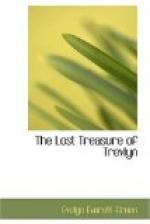Mistress Dowsabel would gladly have accompanied her sister, for she was always nervous and ill at ease in her absence, but she was withheld by two considerations. In the first place, she was suffering from what was then termed a rheum, which we should call a bad cold in the head, so that the idea of a wet cold journey of some hours’ duration was exceedingly unwelcome; in the second, it was not thought seemly by either sister that the young girls, their guests, should be left in the house without some guardian and protector; and Mistress Dowsabel therefore decided to put her fears on one side and remain in charge.
“And beside, what is there to fear?” Lady Humbert had said, in her decisive and cheery fashion. “We are quiet and peaceable folks, and have naught to dread either at home or abroad. I shall strive to be but three nights absent; and our merry Kate will uphold thy spirits, sister, till my return. Thou wilt be better by the fireside than journeying in the saddle this tempestuous weather.”
This fact was self evident, and Mistress Dowsabel had no desire to leave the fireside.
“I must e’en do the best I can without thee, sister,” she said. “I doubt not my fears be foolish. I will strive that the girls be not affected thereby.”
“I trow it would be no easy matter to teach them to Kate,” said Lady Humbert with a smile. “She has all the spirit of Wyvern and Trevlyn combined. She will be a stanch protector for thee, Dowsabel, if thou art troubled by strange noises in the wainscot, or by the barking of the dogs without.”
“Thou thinkest me a sad coward, sister; and so perchance I am,” said meek Mistress Dowsabel. “But if ever thou art absent from the house, I am beset by a thousand fears that assail me not at any other time. My heart is heavy as lead within me now.”
But Lady Humbert could not delay her journey on that account. She said something equivalent to “Fiddle dee dee!” and hastened forward her preparations with her customary energy. Kate flitted about and chattered merrily to her, having won her way by that time to a very soft spot in the heart of her ancient kinswoman.
“I am glad to leave thee with thy aunt Dowsabel, child,” said Lady Humbert before she left. “Ellen will read to her and see to her possets and her little fire-side comforts; but thou wilt assist her to overlook the household and servants, and cheer up her spirits and her courage if either should flag. She is strangely timid when I am not by. Thou must do what thou canst to keep away her fears.”
“Fears!” echoed Kate, laughing; “why, wherefore should we fear?”
“There is small cause, but Dowsabel is by nature timorous, and she will lean on thee, child though thou art, when I am gone. There be certain charges I would lay upon thee. The men will be gone, all but old Thomas within doors and Joshua without; wherefore I will ask thee to go round the house thyself at dusk each eve, and see that all bolts and bars be securely drawn. That is Andrew’s work, but he will be with me. Dyson and thou hadst better go together—or thou and Cherry. Thou wilt not be afraid of such a task?”




